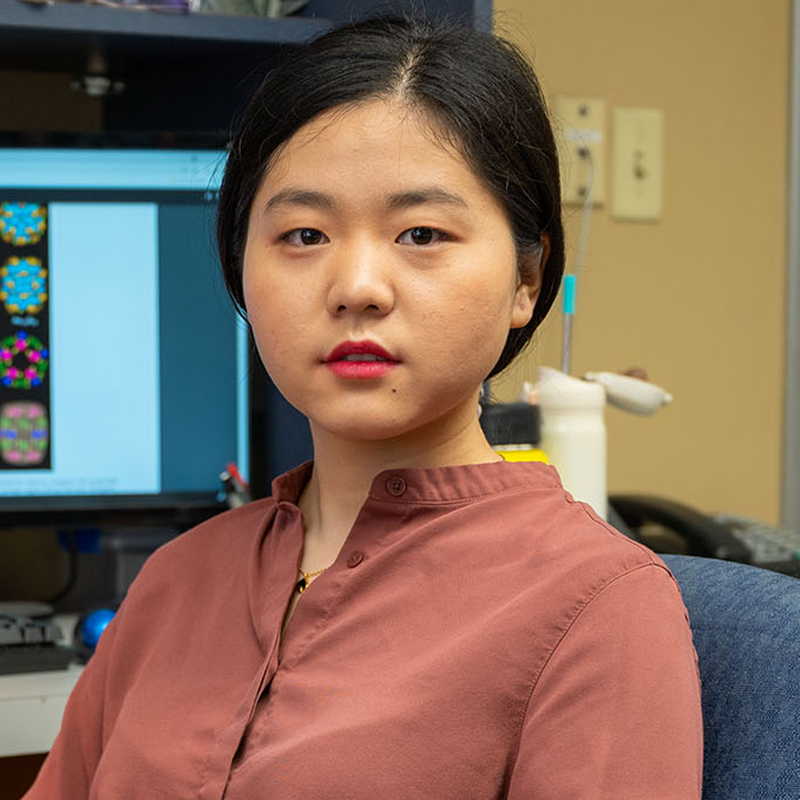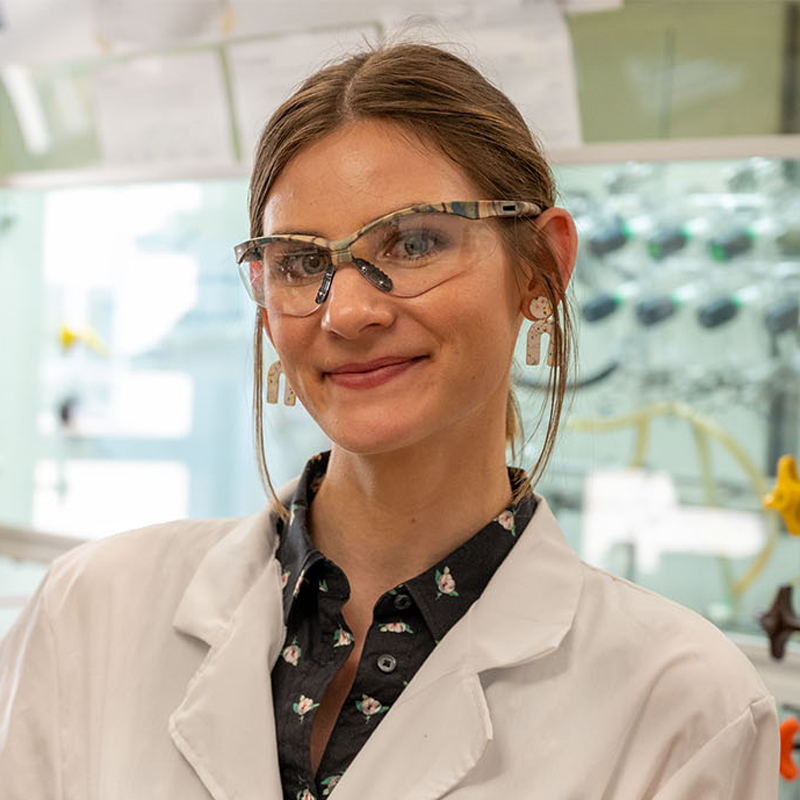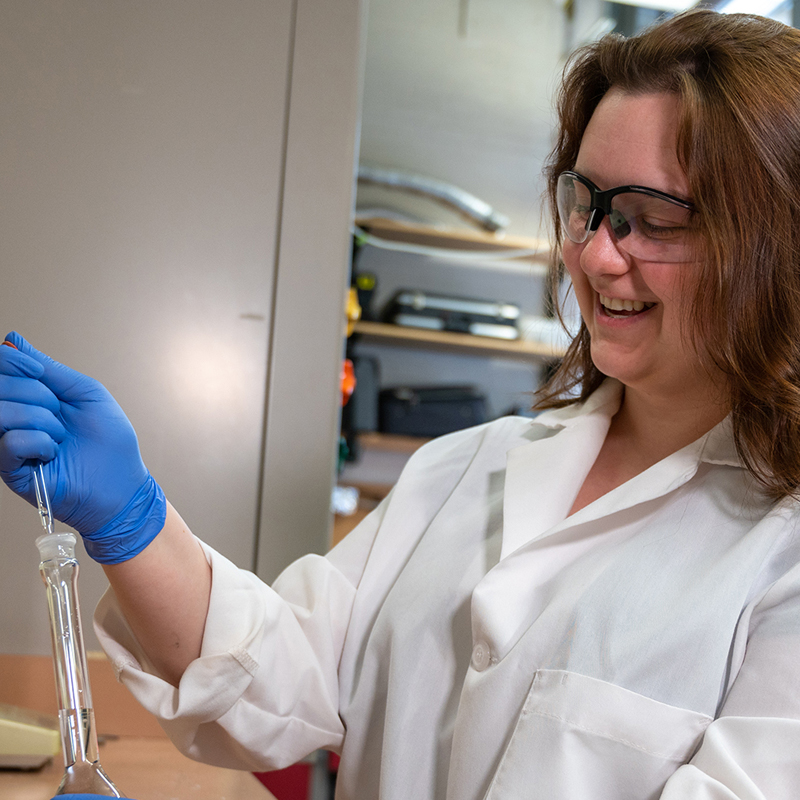Student Stories
Xiangsha Du Wins Kwolek Fellowship
Based in the lab of Professor of Chemistry Rongchao Jin, Du’s research works toward the controlled synthesis and characterization of atomically precise gold and bimetallic gold/silver nanoclusters that span the non-metallic to metallic state.
“The grand evolution within this region will greatly deepen scientific understanding of the nature of quantum-sized gold/silver nanoclusters and will also provide implications for plasmonic nanoparticles,” Du said.
Jin noted that Du’s research addresses a “very fundamental” question in many textbooks — how metallic bonds are formed.
“By taking ‘snapshots’ of the size evolution of atomically precise gold (and bimetallic) nanoclusters, Xiangsha hopes to map out the diminishing HOMO-LUMO gap with increasing size and how the factors such as symmetry and doping influence the metallic bond formation,” he explained.
Du said that the Kwolek Fellowship will allow her to purchase necessary supplies to continue this work.
Karoline Eckhart Wins Kwolek Fellowship
Eckhart’s research is focused on developing biomaterials based on nanocarbons, peptides and polysaccharides in the lab of Associate Professor of Chemistry Stefanie Sydlik. These materials can be used to affect mammalian and bacterial cell behavior, she noted.
“Our cell-instructive biomaterials have potential to accelerate wound healing by serving as a regenerative tissue scaffold, preventing biofilm formation, or by preventing a bacterial infection,” Eckhart said.
In addition to her research work, Eckhart has taken an active leadership role in her lab, often mentoring multiple undergraduate students at a time, Sydlik said.
“Undergraduate mentoring is important to me because it provides an opportunity for students to learn chemistry by doing it in a real research setting,” Eckhart said. “Hands-on research experience is the best way to learn how to be a chemist, and it’s what sparked my passion for chemistry — I love providing that for younger chemists.” She noted that the Kwolek Fellowship will help support her in continuing this vital work as she finishes her last year of research at Carnegie Mellon.
Bailey Bowers Wins Rath Award
Bailey Bowers, a Ph.D. candidate in the Department of Chemistry, has received the 2022 Bhakta and Sushama Rath Graduate Award for her research in environmental chemistry. The award supports a Ph.D. student in a STEM field whose research benefits U.S. industry or societal needs.
Bowers’ research investigates hazardous “everyday everywhere chemicals.”
“Many consumer products have chemicals in them that are toxic to humans at low doses. They can cause endocrine disrupting effects or contribute to cancer and fertility issues,” said Bowers. “There are tens of thousands of chemicals on the market, many of which are not well-characterized. My research focuses on how these everyday everywhere chemicals move throughout the environment and how they’re transformed in the environment.”
One type of chemical that Bowers studies is per- and polyfluoroalkyl substances (PFAS), which are used in nonstick cookware, waterproof coatings, food packaging, personal care products and firefighting foams. PFAS are often called forever chemicals because the molecules have extremely strong bonds between carbon and fluorine, which makes them persist in the environment long after they are fabricated. Though these properties are excellent for raincoats and nonstick pans, they can be extremely harmful for the environment. There are thousands of PFAS, and they are found in many different consumer, commercial and industrial products. Their widespread usage and extreme persistence have resulted in contamination of many environmental areas, including drinking water.
“This class of compounds poses some of the biggest challenges among the everyday everywhere chemicals,” said Bowers. “A lot of my research has been on developing better methods to measure them, especially in the atmosphere, and developing better methods to remediate them.”
Bowers first became interested in environmental chemistry during her undergraduate work at the College of Wooster. In preparation for her senior thesis, she read an article on the lasting impacts of pharmaceuticals in the environment by Terrence J. Collins, the Teresa Heinz Professor of Green Chemistry and the director of the Institute for Green Science at Carnegie Mellon University. Finding this article inspired her to come to Carnegie Mellon and work closely with the environmental chemists at the Mellon College of Science. Here, she has worked closely with her adviser Ryan Sullivan, professor of chemistry and associate director of the Institute for Green Science, to further understand the effects of everyday everywhere chemicals.
Bowers sees her work as vital to remediating the effects PFAS have on both people and the environment. Exposure to certain levels of PFAS may lead to a variety of health effects, including developmental delays in children, increased risk of some cancers and increased cholesterol levels.
“If these chemicals persist, they’re going to be in our environment forever, and they’re going to be in people forever,” said Bowers. “We need to figure out a way to remove these from water so people cannot be exposed to them.”
After defending her Ph.D. in July, Bowers began working as a visiting professor at Earlham College in Indiana. She hopes to inspire future generations of chemists to think critically about their work and how it affects the environment.
“I think it’s super important that we educate the next generation of chemists about sustainability, about using their chemical toolbox to look at a molecule and realize it will not be a smart thing to put in the environment, even if it could make for a profitable product,” said Bowers.



